






Thought Piece: Catalysing Agribusiness Expansion into Kenya’s Intermediary Cities through SUED
Context: Unlocking Urban Economic Potential
Kenya’s intermediary cities are becoming critical engines of economic transformation, yet the private sector investment has often been limited due to infrastructure gaps, market inefficiencies, and perceived risks. The UK Government funded Sustainable Urban Economic Development (SUED) Programme has catalysed private investment into these geographies by combining prefeasibility studies, investor outreach, and seed funding. Two case studies demonstrate SUED’s catalytic role: Avocado Avenue’s Avocado Oil Processing Facility in Kerugoya-Kutus (Kirinyaga County) and Fresh Products Limited’s (TFP) Avocado Packhouse in Eldoret (Uasin Gishu County). Both projects highlight how SUED enabled agribusinesses to expand into new geographies, creating urban-rural value chains, generating jobs, and positioning municipalities as competitive agribusiness hubs.
SUED’s strategic interventions in Eldoret and Kerugoya-Kutus Municipalities have demonstrated how targeted support can unlock agribusiness potential in intermediary cities. These projects were not just about infrastructure they were about vision, timing, and catalytic investment.
• Fresh Products Limited (TFP) was drawn to Eldoret through SUED’s Urban Economic Plan (UEP), which identified avocado as a high-potential value chain in the North Rift region. Despite having no prior plans to expand there, SUED’s prefeasibility study and seed fund proposition convinced TFP to establish a pack house in Eldoret a region with rising avocado production but lacking processing infrastructure.
• Avocado Avenue, operating in Ruiru, saw Kerugoya-Kutus as a strategic expansion point due to its location within the Central Kenya avocado belt. SUED’s prefeasibility study, climate resilience assessment, and seed fund support helped Avocado Avenue overcome entry barriers and commit to building a 60-tonne/day oil processing facility.
SUED’s additionality was clear:
• It de-risked private investment through seed funding.
• It provided technical assistance and prefeasibility studies that validated the business case.
• It facilitated county-level engagement, helping businesses secure land, licenses, and farmer networks.
These interventions created a compelling value proposition for both companies to expand into new geographic areas areas where they previously had no physical presence.
Both companies leveraged SUED’s support to establish operations that not only served their commercial interests but also embedded them deeply into local economies.
• TFP’s Eldoret pack house is designed to process over 6,000 tonnes of avocado annually, creating 4,114 full-time equivalent jobs and contracting 4,000 farmers. SUED’s support enabled TFP to access cold storage and processing machinery; critical infrastructure for first-mover advantage in a region with limited competition.
• Avocado Avenue’s oil processing plant in Kerugoya will create 1,276 jobs and engage over 1,000 farmers. SUED’s seed fund is helping finance essential components like wastewater treatment systems, weighbridges, and handling crates giving the company a competitive edge in quality, sustainability, and scale.
SUED also facilitated:
• Farmer outreach and training programs through partnership with the local government
• Linkages with cooperatives with support from the county and municipal leadership
• Climate-smart practices, including waste recycling and agroforestry.
These elements is helping both companies build resilient supply chains and position themselves as leaders in their respective regions.
The expansion strategies of both companies were rooted in partnership and ecosystem development.
• TFP partnered with farmer groups and worked closely with the County Government of Uasin Gishu to access farmers and promote avocado as a cash crop. Their presence is expected to attract other agribusinesses to Eldoret, creating agglomeration effects and stimulating the local economy.
• Avocado Avenue is engaging with cooperatives, agronomists, and sustainability partners like Flybot (for waste management) and Winfield Africa (for seedling grafting). Their facility in Kerugoya will be strategically located near the A2 highway, enhancing logistics and accessibility.
From a business perspective, the most effort-intensive aspect of expansion was:
• Farmer mobilisation and contract formalisation requiring trust-building, training, and consistent engagement.
• Infrastructure development from land acquisition to machinery installation.
SUED’s role in anticipating and supporting these challenges was pivotal. By offering phased seed fund disbursements tied to milestones, SUED ensured accountability while enabling progress.
The stories of Fresh Products Limited and Avocado Avenue illustrate how SUED’s model combining technical support, catalytic funding, and strategic partnerships can transform intermediary cities into agribusiness hubs. These expansions are not just commercial wins; they are blueprints for inclusive, climate-resilient urban economic development.